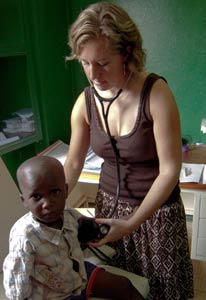Studying malaria and bioethics in Mali
August 2010 | Volume 9, Issue 4
Dr. Jessica Manning
Fogarty International Clinical Research Scholar
Dogo toro! Dogo toro! Pleading chants for a doctor crowd the hallway almost as much as the overheated bodies sprawled on woven mats. Pungent odors of onions and spiced tea fill the dry air as the red Malian sun slowly rises. I am three months into malaria season at a rural 22-bed hospital in the Sahel, an oft-forgotten inhospitable strip of arid land sandwiched between the Sahara and sub-tropical regions to the south. I am exhausted. My white coat hangs heavy with soaking perspiration and pockets full of highly coveted latex gloves. Another child arrives by donkey cart, limp in the arms of a mother who is unresponsive to her wailing.

Photo courtesy of Dr. Jessica Manning
Dr. Jessica Manning conducted
malaria vaccine research as a
Fogarty International Clinical
Research Scholar in Mali.
So began a day in the life of Dr. Jessica Manning, who recorded her experiences as a Fogarty International Clinical Research Scholar in 2008. She arrived in Mali with an interest in malaria vaccine development and left with a better understanding of the realities of global health.
“We are often reminded in medicine that we can only do so much,” says Manning, “But shortcomings are what drive our desire to do clinical research - to improve, to advance, to care - so that one day when someone is looking for a miracle, we can deliver.”
Previously, Manning spent a summer with the evaluation team of the President’s Emergency Plan for AIDS Relief, known as PEPFAR. The experience motivated her to look for ways to speed up the effort and increase its effectiveness.
“My birds-eye view of the problem provoked a desire to be in Africa carrying out research essential to effective policy,” she says. “To achieve that goal, the Fogarty fellowship offered priceless preparation.”
Manning’s mentor, director of the University of Bamako’s Malaria Research and Training Center, quickly helped her acclimatize. Shortly after Manning arrived, Dr. Ogobara Doumbo invited her to a far-flung field site. “Unbeknownst to me,” she says, “we embarked on a week-long road trip, visiting friends and families as we made our way north. We had long conversations about the burden of malaria and what science could do to alleviate it.” By the trip’s end, she had collected abundant information for her research projects and enhanced her cultural awareness.
In addition to conducting malaria vaccine research, Manning also studied local bioethics standards, which at times seemed unrealistic given the context.
“In our small rural clinic, for example, children often arrived in critical condition,” says Manning. “Our research required that we draw blood before administering medication, creating a time-sensitive situation in which a stressed parent had to understand and then decide whether to consent.”
She also learned the value of patience and diplomacy. Americans tend to want to develop a plan and execute it immediately, with maximum efficiency, she notes. But the rest of the world does not necessarily operate that way. “I realized that as the new kid in town, I needed to just be present sometimes and earn trust.”
Currently a resident at Brigham and Women's Hospital and a clinical fellow at Harvard Medical School, Manning remains committed to global health. “I am open to wherever research opportunities take me. I hope - like in Mali - to be able to bridge places and cultures, explore the expanse between bench and bedside and always respect the narrow space between illness and health.”
To view Adobe PDF files,
download current, free accessible plug-ins from Adobe's website.
Related Fogarty Programs
Related World Regions / Countries
Related Global Health Research Topics